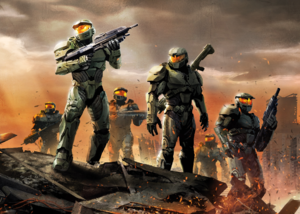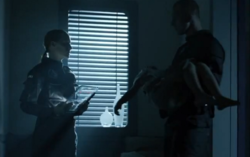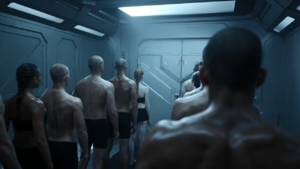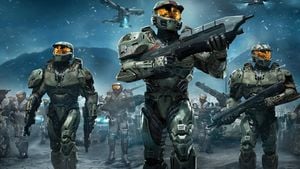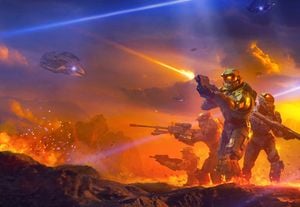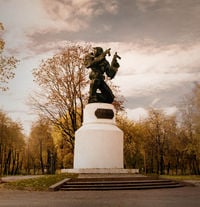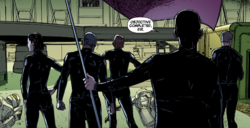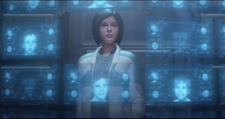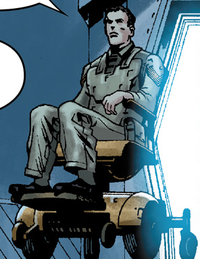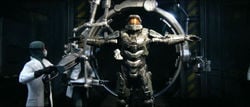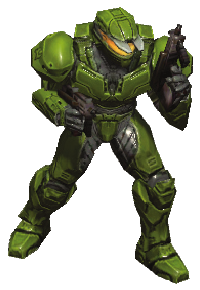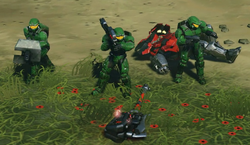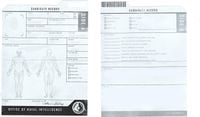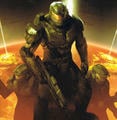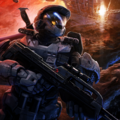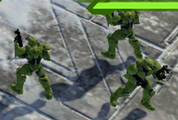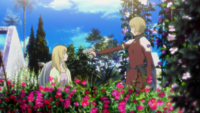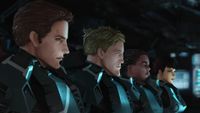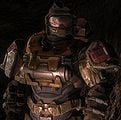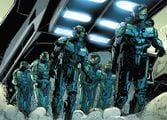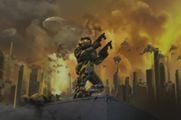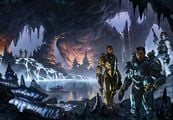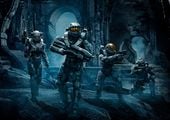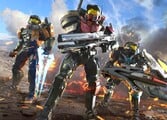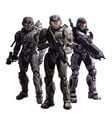SPARTAN-II program
From Halopedia, the Halo wiki
| SPARTAN-II program | |
|---|---|
 The emblem of the Spartan-IIs | |
|
Branch: |
|
|
Type: |
Special operations |
|
Size: |
|
|
Engagements: |
|
|
Commanders: |
|
- "You have been called upon to serve. You will be trained - and you will become the best we can make of you. You will be the protectors of Earth and all her colonies."
- — Dr. Catherine Halsey to the Spartan-II recruits
The SPARTAN-II program was the first major success of the SPARTAN programs, an effort to produce elite soldiers through mechanical and biological augmentation. Originally envisioned as the second generation of the ORION Project under "Generation-II ORION"[3] and "The ORION Project Generation Two",[4] SPARTAN-II would be the first in the series to meld advanced exoskeleton technology with the soldiers' superior physiques.[5][6]
Spartan-IIs experienced the most extensive and invasive physical augmentations out of all the Spartan generations, starting augmentation at early pubescent ages increased their physical mass and height to around seven feet by adult age.
History
- "From the beginning Spartans were a weapon of last resort. We were built for combat and raised for war."
- — Master Chief Petty Officer John-117[7]
Background
In the years following the deactivation of the original ORION Project in 2506[8] the effectiveness of small special forces combating the Insurrectionists became too difficult for the UNSC to manage. As insurrectionist forces become more effective and the military's responses consequently become more forceful, the need for large scale military campaigns became more and more obvious.
Around 2510, the Office of Naval Intelligence began to reexamine the Carver Findings, which had warned of instability in the Outer Colonies years earlier.[9] The report rationalized that the instability would continue to escalate, and unless drastic military measures were taken, would result in a massive war between the Inner and Outer Colonies. ONI's own projections at that time and up to 2525[10] concluded the same as Dr. Carver's findings. Meanwhile, then-eighteen year old civilian scientist Dr. Catherine Halsey had been improving upon Carver's report on her own. Her independent conclusions predicted an even darker future than Carver's model, with UNSC inaction against the rebel leadership resulting in a minimum of thirty years of war and five billion dead; the maximum was a conflict of indeterminate length potentially leading to the downfall of human civilization. Halsey presented her results to Vice Admiral Michael Stanforth of ONI Section III, finding that they had come to the same conclusions. Determined to prevent the predicted carnage, Halsey agreed to work for ONI, specifically Section III's Special Projects Division, on creating a solution.[6]
Creation
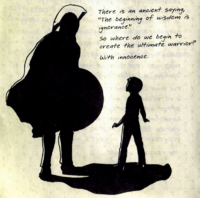
Generation II of the ORION Project was initiated in 2511 as the best possible solution to end the widespread insurgency that raged throughout UNSC space.[6] The project was created with several goals in mind. The first goal was to create a group of elite soldiers meant to subdue insurrections in their infancy, without substantial military casualties. The second goal was to minimize civilian casualties and avert civil war. The third goal was to substantially reduce the cost of conventional means of pacification.
Dr. Halsey's proposal for the project detailed radical changes from the original ORION in many different fields. The first and most controversial was the subjects themselves, who were selected by a gene-candidate pool, and must fit into a certain age restriction protocol. They must also have possessed superior physical and mental attributes. The trainees must be instilled with military value, and the understanding of war; something that cannot be taught to enlisted soldiers. This narrowed the candidates down to children who would be raised and taught in the art of warfare and military values, from a young age. Using such controversial means of creating a soldier meant that the project would have to be carried out in the highest form of secrecy.[6]
Though conventional body armor had protected soldiers for centuries, the Gen-II project's second radical change involved integrating the subject with a new powered exoskeleton device, designed to help keep its user safe and provide a powerful means of combating enemy forces. The drawback of this new armor is its requirement for augmenting the subject, effectively turning the participants into human guinea pigs.[6]
Despite the tremendous risk and the unethical means of creating new soldiers, ORION Generation II was greenlit by the top brass within the Office of Naval Intelligence, who concluded that the lives that could be saved far outweighed the risks involved. The project was initially granted funding for 300 candidates, though funding was later reduced to half this number.[6] By 2517, 150 suitable candidates had been identified through DNA gathered from the UNSC's Outer Colony vaccination program, though funding had been further reduced to support only half that number. 75 children, all around six years old and of both sexes, were kidnapped. In order to preserve the program's secrecy, the children were replaced by flash clones, which would die soon thereafter due to numerous medical complications associated with flash-cloning an entire human being.[6]
Dr. Halsey's use of cloning, following the dissemination of information on the project to the rest of ONI, came to be regarded one of the most controversial decisions involved with the program. In particular, the decision drew the anger of Admiral Margaret Parangosky, Commander in Chief of ONI, who interrogated Halsey after her capture and demanded to know her reasoning for the use of flash clones. Parangosky viewed the clones as unnecessary, maintaining that Halsey replaced the abductees with clones for personal, moral reasons, believing that she was giving the families closure and thus easing her own conscience.[6]
Halsey was not satisfied with the project's original name of ORION Project, Generation II; thus, she renamed it out of personal preference, as well as to distance the project from the failures of ORION in the minds of the politico and military bureaucrats who controlled the project's budget. In order to pay homage to the sacrifice of the ORION project, she chose to call the project SPARTAN-II. She considered several other "bellicose" names, including Praetorians, Landsknecht, Immortals, Minutemen, Titans, Argonauts, Odysseus, Olympians, Zulu, Kronos, Promethean, Armor, Nemesis, Daedalus, Hercules, Viking, and Hyperion; the latter two were quickly excluded.[6]
Training
- Main article: SPARTAN-II training
After being kidnapped and sedated, the Spartan-II candidates were taken to the colony world Reach, where they began their training under Chief Petty Officer Franklin Mendez and the AI Déjà, who also acted as an aide for Halsey on the program. To marginalize the civilian lives they had once led, their names became a combination of their given names and a number, with family names being discarded.[11] Based mainly within the Reach FLEETCOM Military Complex, the Spartans endured a great deal of hardship during their first years of training: they were placed into situations and drills that pushed their abilities to their very limit and beyond. Their hard training was complemented with high-level education, which included mathematics, science, history, reading, writing, and military tactics.
Although his training methodology was tough, even brutal in some regards, Chief Petty Officer Mendez always instilled discipline, honor, and respect into the Spartans. He taught the Spartans how to kill, but at the same time he taught them the difference between right and wrong. During this time, John-117 rose to be the de facto leader of the Spartans. Mendez trained the Spartans until 2525 when, at the age of fourteen, they would go through the toughest part of their training: the biological augmentation procedures, which would kill 30 of the 75 conscripted children and cripple twelve others who would "wash out" of the SPARTAN-II program, going on to join the Office of Naval Intelligence. Only 33 survived the procedures without physiological deformities, of whom two would commit suicide in the following weeks upon encountering their flash clones.[12][13] The bodies of those candidates who "washed out" were placed in cryonic suspension in the hope that they could some day be resuscitated. At least some of the candidates who were crippled may have been physically rehabilitated in later years.[6]
Human-Covenant War
The Human-Covenant War marked a change in objectives for the program; originally intended to quell rebellions, the Spartans were now forced into battle against a superior opponent to the insurrectionists: the Covenant. This new threat accelerated the Spartans' training to its final phase: Project MJOLNIR. With the Mjolnir armor, the Spartans would be the first major UNSC response to the alien threat.[14] The Spartans continuously proved highly effective against all threats; their heroic rearguard and delaying actions saved countless human lives from the genocidal Covenant onslaught. In 2547,[15] the SPARTAN-II program was revealed to the public in an effort to boost morale among the UNSC.[16] The Spartans' prowess was not lost on the Covenant, who came to fear, and in the case of the Sangheili, respect the Spartans as Demons.
Inevitably the small number of Spartan-IIs dwindled as casualties were sustained. As the exploits of the Spartans were a major propaganda boon to the UNSC, Section II of the Office of Naval Intelligence issued Directive 930,[16] which stated that Spartans killed or wounded would be listed as "missing in action" (MIA) or "wounded in action" (WIA), thus maintaining the illusion of the Spartans' invincibility. By August 27, 2552, 25 of the 28 remaining Spartan-IIs assigned to NAVSPECWEAP,[17][18][19][20][21] except Gray Team, had been recalled to Reach, some from combat,[17] to receive new orders for Operation: RED FLAG, a mission that HIGHCOM hoped would end the war.[22] They would commandeer a Covenant vessel, locate the Covenant homeworld, and return with captured Covenant leadership to force a ceasefire. The artificial intelligence construct Cortana, carried within John-117's Mark V Mjolnir armor, would serve as the strike force's hacker and technology specialist.
However, all preparations were interrupted and subsequently canceled by the Covenant's invasion of Reach. In the ensuing disaster, most of the Spartan-IIs were killed, although some took shelter in ONI's CASTLE Base. Two escaped aboard the UNSC Pillar of Autumn, one of whom was place in cryostasis aboard the ship after sustaining life-threatening injuries during the battle on Gamma Station. The Pillar of Autumn soon arrived at Halo Installation 04, which John-117 ultimately destroyed to prevent the spread of the Flood. Following the Battle of Installation 04, the survivors returned to Reach and were able to rendezvous with the remaining Spartans. The survivors then carried out a raid that resulted in the destruction of a Covenant fleet anchorage, stalling a Covenant plan to invade Earth. SPARTAN-IIs would go on to play pivotal roles in the Battle of Earth, the Battle of Installation 05, the Onyx Conflict and the Battle of Installation 00. Ultimately John-117 would eliminate the Covenant leadership with the help of the Flood and Thel 'Vadam, effectively defeating the Covenant and ending the war. However, he ended up trapped in space on the back half of the UNSC Forward Unto Dawn and was declared missing in action.
Post-war survivors
Sixteen Spartan-IIs are known to have survived the Covenant War: John-117, Frederic-104, Kelly-087, Linda-058, Naomi-010, Jai-006, Adriana-111, Michael-120, Leon-011, Robert-025, August-099, Randall-037, Otto-031, Victor-101, Margaret-053, and Roma-143; the last five have since been killed. There was also the crippled candidates, some surviving past the war's end, such as Musa-096, or Serin-019. The early composition of Red Team: Douglas-042, Jerome-092 and Alice-130, spent most of the war in cryo-sleep and were not awakened until 2559, nearly six years after the war's end.[23] The members of Gray Team were left drifting in space after their latest operation in late 2552 and went to cryo-sleep. In mid 2558, their lifeboat was recovered by a Sangheili fleetmaster, Rojka 'Kaasan, who held them in stasis until their release a few months later. After being transferred to highly covert ONI Kilo-Five unit in 2553, Naomi-010 continued to serve on highly classified operations as of 2558. Though being missing in action since 2532 and discharged from service by ONI in 2546, Randall-037, now a Colonel of the Sedran Colonial Guard, participated in a mission to capture the smugglers of a highly dangerous element used as a weapon in a terrorist attack, and sacrificed himself to ensure the operation's success.[24] At least three members of Omega Team managed to survive the war, though their current status is unknown.[25] Following the ceasefire, the surviving Spartan-IIs were offered the choice of integrating into the newly formed Spartan Operations branch along with the remaining Spartan-IIIs.[26] Some Spartan-IIs are known to have taken part in the training of Spartan-IV personnel.[27]
In 2557, after being missing in action for nearly five years, John-117 stopped the Ur-Didact's attack on Earth after linking up with the UNSC Infinity on Requiem. John subsequently reunited with Blue Team, who faced the Didact again shortly afterward; after defeating the Promethean for the second time,[28] the team continued to serve in the field in a number of classified operations.[29][30] Team Black was stationed on Installation 03,[31] until they were killed by the Didact, dwindling the known number of active Spartan-IIs at the moment, down to eight.[32]
On September 1, 2558, Gray Team were awakened from cryo and found themselves in the middle of a battle between two Sangheili factions, a Jiralhanae faction and the citizens of Suraka on the planet Carrow. The Spartans joined forces with local militia and remnants of one of the Sangheili groups to protect civilians from the Jiralhanae invaders. Together they managed to destroy an underground Forerunner facility housing hundreds of thousands of Sharquoi under the control of Brute Chieftain Hekabe, preventing their deployment to other inhabited worlds and eliminating Hekabe's faction in the process, a dangerous force made up of several Jiralhanae war packs. The conflict also eliminated both Sangheili factions with only Rojka 'Kasaan surviving. Rojka gave up his hatred and thirst for vengeance upon Gray Team and agreed to act as an envoy to the human population of the world for Akato 'Dakaj, the new ruling Kaidon of Rak. After their return to the UNSC, Gray Team were offered a choice to join a specialized interspecies strike team under the Office of Naval Intelligence, to continue operating deep in the Joint Occupation Zone as before. In exchange, they would receive a pardon from Thel 'Vadam for their actions. The Spartans reluctantly agreed to work for ONI, asking for a prowler of their own.[33]
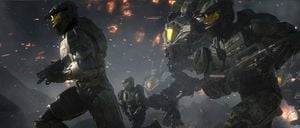
In October 2558, Blue Team tried to prevent the rise of the Created, a faction of rebellious AIs and Promethean forces led by Cortana and the Warden Eternal, who used Forerunner Guardians to enforce the Mantle of Responsibility on the galaxy.[34] However, their attempts proved to be unsuccessful.[35]
In February 2559, after 28 years of drifting in space the UNSC Spirit of Fire found its way to the Forerunner Installation 00, also known as the Ark. Awakened from cryo-sleep, the members of Red Team, in an attempt to establish contact with the UNSC, encountered on the surface of the Ark a hostile mercenary faction known as the Banished, led by the Jiralhanae warlord Atriox.[23] The Spirit of Fire subsequently entered into an ongoing conflict with the Banished for control of the Ark.[36]
As of April 2559, there are fourteen active Spartan-IIs, of whom only the members of Blue and Red teams remained under NAVSPECWAR's operational command, while Gray Team and Naomi-010 continued operating under authority of the Office of Naval Intelligence.[29] The status of Omega Team remains unknown.[25]
In October 2559, Blue Team was sent back to Reach on Operation: WOLFE to retrieve assets from the ruins of CASTLE Base which held the key to defeating Cortana.[37]
In December 2559, Captain Thomas Lasky redeployed the rest of Blue Team on a separate operation of some kind as the Infinity prepared to deploy the Master Chief and the Weapon to Installation 07 to stop Cortana. As a result, they were not on the ship when it was attacked by the Banished and the Master Chief was thrown into space. Rescued in May 2560, the Master Chief played a vital role in the Battle for Zeta Halo against the Banished and the Harbinger.[38]
Personnel
- "Die? Didn't you know? Spartans never die."
- — Lieutenant Commander Kurt Ambrose to Fleet Master 'Mantakree, referencing ONI Directive 930[39]
Publicity
ONI publicly unveiled the SPARTAN-II program in 2547 in order to boost morale,[15][40] though the supersoldiers' true origins remain classified to the general public as of 2558.[41] The 2547 CAA Factbook entry on the Spartans states that the supersoldiers are "recruited from all corners of UNSC governed space" and that "each of them is a highly decorated veteran with literal decades of combat experience", but omits the program's ethically problematic background.[42] At least John-117, who was elevated to a legendary status as the "Master Chief" in the final months of the war, was given an elaborate, inspiring origin story to hide his true background, promoted by several individuals claiming to have known or interacted with John at some point.[41] However, as of 2553, there were pervasive rumors among the UNSC military that the Spartans had been kidnapped as six-year-old children and replaced by flash clones.[43] Admiral Parangosky planned to unveil the SPARTAN-II program's classified aspects to the UEG defense committee by early 2553,[44] although any information on their origins remained unconfirmed among military personnel as of 2555.[45] The information is not public knowledge as of 2558,[41][46] although some of the Spartan-IVs were made aware of their predecessors' origins.[notes 1] At some point in 2558, journalist Benjamin Giraud uncovered the origins of the program and uploaded his findings to the public network, along with delivering an unsanctioned testimony on the matter to the Unified Earth Government Senate's Armed Forces Committee. This compounded an increasing distrust against ONI and the Spartans generated by a recent attack on a peace conference apparently perpetrated by the Master Chief.[13]
To marginalize the civilian lives they had once led, their names became a combination of their given names and numbered service tag, with family names being discarded. The identities of the Spartans' full names have been deleted from all military records. Only Dr. Halsey had secret files that contained the full names of all the Spartans on Reach; unfortunately, the records were destroyed after the planet was glassed.[11] The only other copy of these records is in the possession of Admiral Margaret Parangosky.[47] Within the military and to the public the Spartans are only known by their service tags, consisting of "SPARTAN" followed by a numerical ID; only a select few outsiders know even their first names.[48]
Psychology
While many outsiders view them as single-minded, the Spartan-IIs remain independent thinkers;[49] from early on, Dr. Halsey's intent was to mold the candidates into effective soldiers through "persuasion and acclimation" as opposed to the brainwashing suggested by some of her colleagues within ONI, believing that in order to be truly efficient, the Spartans must be able to properly understand and embrace the significance of their mission.[6] As such, the Spartans possess a profound understanding of their role as weapons and the weight of the life imposed on them. Most of them do not hold grudges over their abduction and treatment, instead having come to embrace their lives as Spartans as both a necessity and something they were born to do.[50]
The Spartan-IIs' training emphasized dedication to one's duty as well as winning at any cost, values most of the active Spartan-IIs remain committed to. They have frequently been shown to ignore concerns over their personal health as long as there remains a mission to complete[51] and tend to become incredibly frustrated when prevented from acting in a combat situation; because of this they generally prefer planetary operations to being based aboard starships with no way to contribute to an engagement.[52][53]
The Spartan-IIs enjoy a great deal of solidarity and camaraderie within their group due to them having grown up together; indeed, they consider their fellow Spartans family,[54][55] something that was encouraged in their indoctrination from a young age.[56] Having been taught to refrain from overt emotional displays, the Spartan-IIs most commonly convey their emotions through subtle body language and cryptic gestures. They possess numerous unique internal habits and signals conveyed through simple gestures or statements, making interactions among their group largely indecipherable to outsiders.[57] Only a select few outsiders, including Dr. Halsey and Déjà, are privy to some of the best-held secrets within the group. Their familiarity with each other's body language allows the Spartan-IIs to function in perfect synergy in combat, their teamwork abilities having been described as borderline telepathic.[58] Although the Spartan-IIs often have difficulty socializing with baseline humans outside situations of a strictly military nature, they are rather gregarious among themselves and habitually cluster together while out of the battlefield, commonly engaging in activities such as playing cards, exercising together, reading, or maintaining their personal equipment.[59]
Most humans view the Spartan-IIs with awe, sometimes even revulsion, due to both their reputation and intimidating presence,[60] the latter complemented by the seemingly unnatural speed, precision and grace of their movements.[61] Few outsiders are willing to as much as touch a Spartan, such as shaking one's hand.[62]
Organization
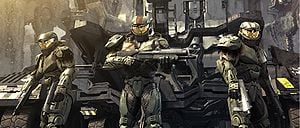
The majority of the Spartan-IIs serve under Naval Special Weapons,[1][2] a division of the UNSC Special Forces with heavy ties to Section Three of the Office of Naval Intelligence, which initiated and operated the SPARTAN-II program.[63] This remains unchanged despite the formation of the new Spartan Operations branch in the post-war era.[29] All Spartan-IIs graduated to the rank of petty officer second class at the conclusion of their training,[64] though many have since risen to a higher rank. In particular, John-117, the Spartans' de facto leader rose to the rank of Master Chief Petty Officer in 2526[65] while Frederic-104 was promoted to Lieutenant, Junior Grade in 2552 by Lieutenant Commander Kurt Ambrose, himself a Spartan-II who had been recruited to lead the SPARTAN-III program years before.[66]
The Spartan-IIs enjoy a large degree of operational autonomy in the field and typically operate in teams of three to five and even individually,[27] although the size and composition of these teams is heavily mission-specific; a team leader will typically pick the Spartans best suited for the mission at hand according to their personal talents.[67][68][69] However, with the original Spartan-II group dispersed across the battlefields of the Covenant War over the decades, certain team arrangements became more established than others.[70] Spartan-II teams are assigned color-based designations on a mission-specific basis, Blue, Red and Green teams being the most prominent of these.[68] On some missions, Red Team has formed smaller splinter units (designated with Greek alphabet) to better suit the mission objectives at the time. Some Spartan-II teams appear to have been more well-established since their training, namely Black and Gray teams which continued to operate with their compositions unchanged over the Covenant War.[55]
- Known Spartan-II fireteams
- Black Team - Unconventional warfare unit of the Office of Naval Intelligence.
- Blue Team - Strike team.
- Gold Team - Strike team.
- Gray Team - Deep infiltration unit. Later reorganized into a part of a specialized interspecies strike team of ONI.
- Green Team - Strike team.
- Omega Team - Fast reaction unit.
- Red Team - Strike team.
- Silver Team - Strike team.
- Yellow Team - Combat engineers unit.
Class I
The following is the list of all known Spartan-II subjects conscripted in 2517. Of the 150 children considered for the program, only 75 were conscripted. The only known candidate who was not conscripted was Caleb Aagard, who would have been designated SPARTAN-095.
Successfully augmented
Deceased Spartans are assumed to be officially listed missing in action or wounded in action, even if known with certainty to be KIA. This is for morale purposes, to enable the claim that no Spartan has ever been killed. Those who truly are missing are listed as such.
- James-005 - MIA. Assumed KIA during the mission to Gamma Station in the Fall of Reach (8/30/2552).
- Jai-006 - Active as of September 2558.
- Li-008 - Assumed KIA during a battle inside an anomalous form of slipspace (September 2552).
- Naomi-010 - Active as of 2558.
- Leon-011 - Active as of October 2558
- Daisy-023 - Confirmed KIA during the Human-Covenant War (unknown date).
- Robert-025 - Active as of October 2558.
- Riz-028 - Active as of 2540.
- Joshua-029 - Assumed KIA during the Fall of Reach while assaulting a Covenant cruiser (8/30/2552).
- Vinh-030 - Assumed KIA while attempting to escape Reach (9/7/2552).
- Samuel-034 - Confirmed KIA aboard the Covenant vessel Unrelenting. First SPARTAN-II to be killed in action (11/27/2525).
- Randall-037 - Went MIA in during the Battle of Vodin in 2532; augmentations partially curtailed and discharged from service by ONI in 2546.[71] Confirmed KIA during the Mission to Alpha Shard. (February 2556)
- Isaac-039 - Assumed KIA while attempting to escape Reach (9/7/2552).
- William-043 - Confirmed KIA during the Battle of Onyx (11/3/2552).
- Anton-044 - Assumed KIA during a battle inside anomalous form of slipspace (September 2552).
- Keiichi-047 - Listed as MIA as of March 3, 2558
- Kurt-051 - Confirmed KIA after the detonation of two FENRIS nuclear warheads at the core of Onyx (11/3/2552).
- Jorge-052 - Confirmed KIA during Operation: UPPER CUT in the Fall of Reach (8/14/2552).
- Linda-058 - Active as of October 2559. Clinically killed during the Fall of Reach (8/30/2552) but resuscitated after the Battle of Installation 04 (9/22/2552).
- Malcolm-059 - Confirmed KIA during the Fall of Reach (8/30/2552).
- Maria-062 - Retired active duty and assigned to UNSC reserves. Last seen working at SWC Songnam in October 2552.
- Sheila-065 - Confirmed KIA during the Battle of Miridem (2544).
- Solomon-069 - Confirmed KIA during Operation: WARM BLANKET (2544).
- Arthur-079 - Confirmed KIA during Operation: WARM BLANKET (2544).
- Kelly-087 - Active as of October 2559.
- Grace-093 - Confirmed KIA during Operation: FIRST STRIKE (9/13/2552).
- August-099 Active as of October 2558.
- Frederic-104 - Active as of October 2559.
- Adriana-111 - Active as of September 2558.
- John-117 - Active as of May 2560.
- Michael-120 - Active as of September 2558.
- Joseph-122 - Status unknown. Last seen in 2525.
- Kai-125 - Active as of 2540.
- Oscar-129 - Suicide by gunshot in 2525.
- Vannak-134 - Active as of 2540.
- Cal-141 - Confirmed KIA during Operation: GREY VEIL (2544).
- One unidentified trainee - Committed suicide after escaping the program in 2525.
- Unidentified Spartan - Confirmed KIA during the Harvest campaign (February 2531).
- "Beta-Romeo Actual" - Assumed KIA during the Fall of Reach (8/30/2552).
- "Red-Fifteen" - Assumed KIA during the Fall of Reach (8/30/2552).
Washouts
12 Spartan-II candidates were officially discharged from the program after failing the augmentation procedures, most becoming severely crippled. The majority of these former candidates were later reassigned to the Office of Naval Intelligence. However, Dr. Halsey hoped that some might be rehabilitated and enter service as fully functional Spartans.[6]
Officially, 30 Spartan candidates were killed when they failed to adapt to their physical enhancements; the only identified fatalites are SPARTAN-013[72] and Edgar-150.[73] However, at least one of the candidates allegedly killed by the augmentation procedures - Serin-019 - actually lived and were pressed into ONI service, their survival kept secret from their peers.
This was presumably made possible by Halsey's insistence that no invasive autopsies be performed and that the funeral for those killed by the procedures be closed-casket, the cadavers instead remaining in cold storage. The doctor considered that some of the deceased Spartans may some day be resuscitated and placed into active service; by June 27, 2525, rehabilitation protocols were in development for 80% of the washouts, with AIs predicting a total survival rate as high as 50%. Halsey also noted her consternation over what ONI may do with a secret team of officially deceased Spartans.[6]
- Kirk-018 - Discharged. Possibly rehabilitated, for which Halsey had expressed hope.
- Serin-019 - Rejected most physical augmentations; physical damage largely repaired by ONI. Recruited as an ONI field agent, adopting the surname "Osman." Later became the protégé of Admiral Margaret Parangosky and was handpicked by the latter to lead the black ops team Kilo-Five. Serves as Commander-in-Chief of the Office of Naval Intelligence as of September 2558.[74]
- Otto-031 - Discharged. Fully rehabilitated.[75] Confirmed KIA on Installation 03 (7/25/2557).
- Douglas-042 - Discharged. Fully rehabilitated. Active as of October 2559.
- Margaret-053 - Discharged. Fully rehabilitated.[75] Confirmed KIA on Installation 03 (7/25/2557).
- Soren-066 - Discharged due to failures in augmentation process in 2527.[76] Listed as missing in action on Reach after defecting to the insurrectionists.[77]
- Cassandra-075 - Discharged due to failures in the augmentation procedures in 2525. Residing on the M25L Recovery Station as of October 2552.[78]
- René-081 - Discharged after "washing out". Possibly rehabilitated, for which Halsey expressed hope in her journal.
- Fhajad-084 - Discharged and reassigned to ONI. Suffered uncontrollable muscle spasms due to failures in augmentation. Published a paper on slipspace physics in May 2540.[79].
- Jerome-092 - Discharged. Fully rehabilitated. Active as of October 2559.
- Musa-096 - Forced into a wheelchair for the rest of his life due to the augmentation procedures. Later became a commander and the head of the SPARTAN-IV program.[80]
- Victor-101 - Discharged. Fully rehabilitated.[75] Confirmed KIA on Installation 03 (7/25/2557).
- Ralph-103 - Failed to adapt fully to augmentations; discharged due to experiencing irreparable psychological trauma after escaping the program in 2525. Later joined the UNSC Marine Corps. Killed in action during the Human-Covenant War.[81][82]
- Alice-130 - Discharged. Fully rehabilitated. Active as of October 2559.
- Roma-143 - Discharged. Fully rehabilitated.[75] Confirmed KIA on Installation 03 (7/25/2557).
Unknown status
- The status of candidates 116, 118, 119, 121, 123, and 124 after September 10, 2517 is unknown.[83]
- Carris-137's status after September 27, 2520 is unknown.
Class II
After the graduation of the first class of Spartan-IIs in 2525, Dr. Halsey began planning for the next wave of Spartans; her efforts, however, ran into problems. There were too few candidates that were in sync with her age and genetic restriction protocols and a majority of her funding was going towards Mjolnir maintenance and construction; this left little room for continued training efforts. By 2531, the majority of her funds had been diverted to other projects, most notably the top-secret, eyes-only SPARTAN-III program.[84] Halsey eventually gave up on Class II and left the program, after she judged the candidates to be of an inferior standard.[85] The Office of Naval Intelligence would ultimately cancel Class II due to the lack of sufficient candidates.[86]
ONI Directive 930
In order to maintain morale among the other forces of the UNSC, the Office of Naval Intelligence created Directive 930. According to it "any Spartan casualties are to be listed as Missing In Action (MIA) or Wounded In Action (WIA), but never Killed In Action (KIA)." The protocol is not applied to members of the SPARTAN-IV program and the Spartan Operations branch, the UNSC opting to honor their sacrifices accordingly rather than maintaining an aura of invincibility for propaganda purposes.
Equipment
Project MJOLNIR
- Main article: MJOLNIR Powered Assault Armor
The Mjolnir armor was created in parallel to the SPARTAN-II project and is the most technologically advanced piece of hardware in human hands. It can provide a Spartan with an incredible amount of protection and strength. The onboard computer system relays basic tactical information including IFF tags, a motion tracker, weaponry information, and health and energy shield level readouts. Later models of the Mjolnir system are capable of carrying a starship-grade AI which can provide tactical data in the field.
Specialized neural interface
- Main article: SPARTAN neural interface
This specialized version of the neural interface is implanted into the skull of a Spartan-II. The standard neural interface provides the neural link between the Spartan-II and the Mjolnir armor. This device allows a starship-grade AI to be carried "between" the host's brain and later models of the Mjolnir armor. John-117 was outfitted with this upgrade due to his need to carry the AI Cortana on a mission to capture the Covenant leadership.
Spartan augmentation procedures
- Main article: SPARTAN-II augmentation procedures
One of the essential and most dangerous aspects of the SPARTAN-II program was the biological augmentation procedures. The process consisted of many injections and surgeries. Only a small percentage of subjects survived the process and fully recovered.
Facilities
The SPARTAN-II program was based in a dedicated compound within the Reach FLEETCOM Military Complex. Most of the Spartans' training was carried out in the various facilities within the complex as well as the surrounding wilderness of Reach's Highland Mountains, with classroom sessions provided by Déjà in the Reach Naval Academy. They were also given training in various offworld locations, including Emerald Cove and Chiron Station. The SPARTAN-II augmentation procedures were conducted in an ONI medical facility in orbit over Reach.
Non-canon and dubious canon appearances
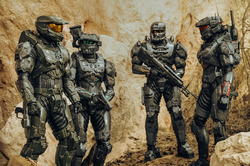
i love bees
Spartan-IIs make an appearance in i love bees, the dubiously canon alternate reality game used for the marketing of Halo 2. The program's most notable divergence in i love bees is the notion that Class II received training and augmentations. Around 2537, enough candidates were within the right age range to begin a second class. One of the most notable candidates, six-year-old Yasmine Zaman, was abducted and replaced by a flash clone. However, she died during the augmentation procedures. Another girl, Janissary James, was selected as a suitable candidate for training. However, her father, an ORION Project member now known as "James James," killed the would-be kidnapper.[87][notes 2]
Dead or Alive
In the fighting game Dead or Alive 4, Nicole-458 is teleported back to the 21st-century aboard Nassau Station. Intriguingly, Nicole has been noted to be "based on a 'real' and properly defined Spartan," but her appearance in Dead or Alive 4 is non-canonical.[88]
Odd One Out
In the Halo Legends episode Odd One Out, SPARTAN-1337 was active and participated in combat at Cronkee.
Silver Timeline
| This article contains information about the Silver Timeline, and is not a part of the established Halo canon. |
- Main article: SPARTAN-II program/Silver
 This section needs expansion. You can help Halopedia by expanding it.
This section needs expansion. You can help Halopedia by expanding it.
Gameplay
Halo Wars
- "Summoning a Spartan to the battlefield is not a guarantee of victory, nor is it something to be taken lightly. It requires a significant investment of time and energy to field Spartans, so they’re not a commonplace sight. When they do end up on the scene though your opponent will have to learn to take the threat of a Spartan on the battlefield seriously, or suffer the consequences."
- — Halo Wars website
In Halo Wars, Spartan-IIs are infantry units for the UNSC faction. They can be built from a Barracks and are perhaps the most versatile units in the game. A Spartan is equipped with energy shields, can wield different weapons, command friendly vehicles, hijack enemy ones, and gain up to 14 veterancy points while other units cap at 3. Any vehicle piloted by a Spartan gains an extra 15% to their defense and damage, with additional stat boosts for every upgrade the Spartan has.[89]
Spartans cost ![]() 300 resources each and require a tech level of
300 resources each and require a tech level of ![]() 1. Only three can be deployed for an army but they do not take up population. By default they are equipped with a pair of submachine guns. Spartans can receive the following upgrades.
1. Only three can be deployed for an army but they do not take up population. By default they are equipped with a pair of submachine guns. Spartans can receive the following upgrades.
- Chaingun:
 300 resources and a tech level of
300 resources and a tech level of  2. Equips an AIE-486H Heavy Machine Gun for increased damage.
2. Equips an AIE-486H Heavy Machine Gun for increased damage. - Neural Implant:
 600 resources and a tech level of
600 resources and a tech level of  3. Allows Spartans to jack enemy vehicles quicker.
3. Allows Spartans to jack enemy vehicles quicker. - Spartan Laser:
 1,000 resources and a tech level of
1,000 resources and a tech level of  4. Gives Spartans more range to their attacks and lets them deal out more damage.
4. Gives Spartans more range to their attacks and lets them deal out more damage.
In the campaign, Spartan Red Team is recruited on Arcadia and available for all missions after Arcadia City.[90] They count as hero units and therefore cannot be killed, only knocked out and slowly healing until they are revived. By default Jerome-092 wields a Spartan Laser, Douglas-042 uses a rocket launcher, and Alice-130 uses a chain gun. Six more Spartans are available during the mission Arcadia Outskirts, identified as Team Omega.[91]
Halo Wars 2
In Halo Wars 2, the Spartan-IIs of Red Team are Hero Units units for the UNSC faction. They can be built from the Armory. Each Spartan now uses a different weapon: Douglas-042 wields the rocket launcher, Alice-130 wields the machine gun turret and Jerome-092 wields the Spartan Laser when fully upgraded; however, all of them start with dual wielded M6C magnums and the "Spartan Slam" ability. Each Spartan is assigned to a different leader: Alice to Isabel, Douglas to Professor Anders, and Jerome to Captain Cutter. All Spartans receive upgrades equally for Tier 1 and 3 but only in Tier 2 will each Spartan receive their personal weapon based on the Leader that the player picked. In the new DLC, Jerome is a leader himself, using Mark IV GEN2 armor obtained from Isabel and Hydra MLRS as a loadout, along with a new mech.
- Info: Ranged hero, Ground pound area attack, One active hero limit.
- Tier: 1
- Cost:
 0,
0,  500,
500,  400
400 - Red Team upgrade: Hijack
- Douglas-042 upgrade: Rocket Launcher
- Alice-130 upgrade: Heavy Machine Gun
- Jerome-092 upgrade: Spartan Laser
- Red Team upgrade: Neural Implant
Trivia
- The SPARTAN-II program's methodology mirrors the agōgē of the ancient Greek city-state of Sparta, where every male child underwent extensive military training from an early age.
- The SPARTAN-II seal closely resembles the modern Seal of the President of the United States. The Halo 3 achievements "UNSC Spartan" and "Spartan Officer" are represented by the SPARTAN-II seal. A cloth patch bearing the SPARTAN-II program's insignia is included with the Limited and Legendary Editions of Halo: Reach.
- The SPARTAN-II program is reminiscent of the Adam Project depicted in the 1998 film Soldier. Both feature children brutally trained and indoctrinated (in the film, the candidates are selected as infants) to become stoic and ruthless commandos to be deployed against human insurgents. The Spartans' naming also echoes that shown in the film: a first name followed by a numeric designation (Soldier's protagonist is named Todd 3465). Certain aspects of the soldiers' training also show close similarities; in the film, the children are forced to watch a pack of dogs devouring a boar whereas in Halo: The Fall of Reach, the Spartans are shown a display of wolves hunting a moose.
- Despite Spartans being listed as Missing in Action when they are killed, several have actually gone MIA. In 2552, Doctor Catherine Halsey listed the three who had actually gone MIA at that point as Kurt-051 in 2531, Randall-037 in 2532 and Sheila-065 in 2544. Despite being listed MIA, Sheila was killed in the Battle of Miridem with her demise witnessed by Halsey. Kurt was secretly abducted for the SPARTAN-III program and Randall was stranded on the planet Vodin following the Battle of Vodin until the UNSC reestablished contact with the planet ten years later. In addition, Kelly-087 was listed as MIA by John-117 following her abduction by Halsey, a status which ended when the UNSC gained control of the Sarcophagus shield world in 2553 and the survivors there were reunited with UNSC forces. John himself went MIA following the Battle of Installation 00 at the end of the Human-Covenant War and remained that way until 2557 when he returned to Earth following the New Phoenix Incident. Gray Team went missing following Operation: SUNSPEAR until 2558 when they were rescued by Melody Azikiwe and reunited with UNSC forces following the Carrow Conflict.
Gallery
Blue Team in Halo: The Fall of Reach.
Blue Team during Operation: FIRST STRIKE in Halo: First Strike.
Kelly-087, Kurt-051, and another Spartan during the Onyx Conflict in Halo: Ghosts of Onyx.
A member of Gray Team during the Battle of the Rubble in Halo: The Cole Protocol.
Daisy-023 faces her clone in Halo Legends: Homecoming.
Blue Team being briefed on the mission to rescue Dr. Halsey in Halo Legends: The Package.
Black Team in Halo: Blood Line.
Jorge-052 in Halo: Reach.
Déjà instructing the Spartan-II children to their seats in a classroom in Halo: Fall of Reach.
Blue Team during the Battle of Circinius IV in Halo 4: Forward Unto Dawn.
A Spartan backflips off a Jiralhanae Chieftain in Halo 4.
John-117 in Hunt the Truth.
Fred-104 with Olivia-G291 and Veta Lopis in Halo: Last Light.
The SPARTAN-II candidates being taught by Déjà in Halo: The Fall of Reach - The Animated Series.
Blue Team in Halo 5: Guardians.
Naomi-010 wearing her Mark VII armor in Halo Mythos.
Red Team in Halo Wars 2.
Spartan-IIs in the Halo Encyclopedia (2022 edition).
List of appearances
Notes
- ^ In Halo: New Blood, in a scene set in 2555, Commander Musa-096 casually tells Edward Buck that the Spartan-IIs were conscripted as children; Buck is surprised that Musa would confirm the rumors that had been circulating within the military for years, indicating the facts had not been publicly disclosed at the time. In Spartan Ops, Anthony Madsen tells Paul DeMarco that Dr. Halsey kidnapped children to create the Spartan-IIs, with DeMarco being unaware of this beforehand. Whether Madsen actually knew the Spartan-IIs' origins for a fact or if he was merely citing the rumors is unclear.
- ^ The Class of 2537 has not been referenced in any official media barring the quasi-canonical i love bees. The timeline of SPARTAN-III Alpha Company mirrors that of Class II, though no official work has called attention to this coincidence. Notably, the first edition of the Halo Encyclopedia (2009 edition) references Yasmine Zaman as a member of the Class of 2525. However, on page 70 of the Halo Encyclopedia (2022 edition), Class II is specifically stated as having been cancelled by the Office of Naval Intelligence due to a lack of sufficient candidates, firmly cementing Class II as never happening, likely even before the candidate training phase.
Sources
- ^ a b Halo: The Essential Visual Guide, page 121
- ^ a b Halo: The Fall of Reach, page 175 (2001)
- ^ ': Limited Edition, Dr. Halsey's personal journal - February 15, 2511
- ^ Halo: Reach: Limited Edition, Dr. Halsey's personal journal - June 19, 2513
- ^ Halo Encyclopedia (2009 edition) page 81
- ^ a b c d e f g h i j k l m Dr. Halsey's personal journal
- ^ YouTube: Halo 5: Guardians Experience - Master Chief Video Logs
- ^ Halo Encyclopedia: The Definitive Guide to the Halo Universe page 34
- ^ Halo Encyclopedia (2009 edition) page 44
- ^ Halo: The Fall of Reach, page 58
- ^ a b Sybex Halo PC Strategy Guide Page 2
- ^ Halo Legends - "Homecoming"
- ^ a b Hunt the Truth, Episode Nine
- ^ Halo: The Fall of Reach page 103
- ^ a b Halo: Ghosts of Onyx page 139
- ^ a b Halo: First Strike page 249
- ^ a b Halo Waypoint - Data Drop 5
- ^ Halo Wars timeline
- ^ Halo: First Strike (2010), Adjunct
- ^ Halo Waypoint - Defiant to the End
- ^ Halo: Combat Evolved Anniversary, Library - Pelican
- ^ Halo: The Fall of Reach page 240
- ^ a b GameSpot: Halo Wars 2 New Story Details and Images Revealed
- ^ Halo: Nightfall
- ^ a b Halo Waypoint: Know-Scope
- ^ Halo: Glasslands, pages 382-389
- ^ a b Halo Waypoint: Spartans
- ^ Halo: Escalation, Issue #10
- ^ a b c Halo Waypoint - John-117 is no longer blue leader (Catalog's answer)
- ^ Halo 4: The Essential Visual Guide
- ^ Halo Waypoint: Catalog Interaction - Page 6
- ^ Halo: Escalation, Issue #8
- ^ Halo: Envoy
- ^ Halo 5: Guardians, campaign level The Breaking
- ^ Halo 5: Guardians, campaign level Guardians
- ^ Halo Wars 2
- ^ Halo: Shadows of Reach
- ^ Halo Infinite
- ^ Halo: Ghosts of Onyx, page 372
- ^ Halo: The Fall of Reach, page 230 (2001)
- ^ a b c Hunt the Truth
- ^ Bungie.net: CAA Factbook: The Spartan Project
- ^ Halo: New Blood, pages 51-52 (Google Play edition)
- ^ Halo: Glasslands, page 434
- ^ Halo: New Blood, pages 128-129 (Google Play edition)
- ^ Halo 4 Limited Edition, Infinity Briefing Packet
- ^ Halo: Glasslands, page 433
- ^ Halo: The Flood, page 90
- ^ Halo 2 Limited Collector's Edition, Conversations from the Universe
- ^ Halo 5: Guardians ViDoc: A Hero Reborn
- ^ Halo: First Strike, pages 124-125, 242 (2003)
- ^ Halo: The Fall of Reach, page 107 (2001)
- ^ Halo: Ghosts of Onyx, page 157
- ^ Halo: First Strike, page 123 (2003)
- ^ a b Halo: Blood Line
- ^ Halo: The Fall of Reach, page 30 (2001)
- ^ Halo: First Strike, pages 120-121, 166, 268, 299 (2003)
- ^ Halo: The Fall of Reach, page 74 (2001)
- ^ Halo: The Fall of Reach, pages 102, 276 (2001)
- ^ Halo: The Fall of Reach, pages 7, 174 (2001)
- ^ Halo: Ghosts of Onyx, page 173
- ^ Halo: Ghosts of Onyx, page 58
- ^ Halo: The Fall of Reach, page 224 (2001)
- ^ Halo: The Fall of Reach, page 99 (2001)
- ^ Halo: Silent Storm
- ^ Halo: Ghosts of Onyx
- ^ Halo: The Fall of Reach, page 78 (2001)
- ^ a b Halo: First Strike, page 4 (2003)
- ^ Halo: First Strike, page 158 (2003)
- ^ Halo: The Fall of Reach, page 240 (2001)
- ^ Halo Waypoint: Randall Aiken
- ^ Scanned
- ^ Halo Waypoint: Canon Fodder - If They Want Lore, We'll Give 'Em Lore
- ^ Spartan Ops, S1E8 Expendable
- ^ a b c d Halo Encyclopedia (2022 edition), page 69
- ^ Halo: Evolutions Pariah page 42
- ^ Halo: Evolutions Pariah page 55
- ^ Conversations from the Universe page 10
- ^ Halo: The Fall of Reach, page 141-142
- ^ Halo: Initiation, Issue #1
- ^ Halo.Bungie.org: Re: Spoiler-free thoughts on the new episodes: "Ralph failed out of the program."
- ^ Halo: The Fall of Reach, 2010 edition bonus content
- ^ Halo: Fall of Reach - Boot Camp, Issue 1
- ^ Halo: Ghosts of Onyx page 45
- ^ Halo: Glasslands pages 72-73
- ^ Halo Encyclopedia (2022 edition), page 70
- ^ Axon Clips Chapter 12
- ^ Halo Waypoint forums — Canon question to 343i about Nicole (Link defunct, Archive here)
- ^ YouTube.com, Ⓦ Halo Wars Legendary Campaign Walkthrough: Linked Comment
- ^ Halo Wars, campaign level Arcadia City
- ^ Halo Wars, campaign level Arcadia Outskirts
| ||||||||
| |||||||||||||||||
